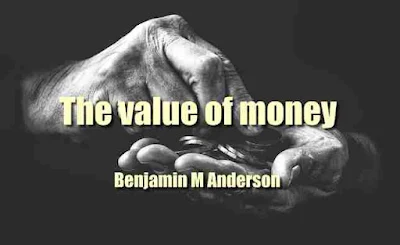The value of money
The following pages have as their central problem the value of money. But the value of money cannot be studied successfully as an isolated problem, and to reach conclusions upon this topic, it has been necessary to consider virtually the whole range of economic theory; the general theory of value; the r61e of money in economic theory and the functions of money in economic life; the theory of the values of stocks and bonds, of "goodwill," established trade connections, trade-marks, and other "intangibles"; the theory of credit; the causes governing the volume of trade, and particularly the place of speculation in the volume of trade; the relation of "static" economic theory to "dynamic" economic theory. "Dynamic economics" is concerned with change and readjustment in economic life.
\
A distinctive doctrine of the present book is that the great bulk of exchanging grows out of dynamic change and that speculation, in particular, constitutes by far the major part of all trade. From this, it follows that the main work of money and credit, as instruments of exchange, is done in the process of dynamic readjustment, and, consequently, that the theory of money and credit must be dynamic. It follows, further, that a theory like the "quantity theory of money," which rests in the notions of "static equilibrium" and "normal adjustment," abstracting from the "transitional process of readjustment," touches the real problems of money and credit not at all.
This thesis has seemed to require statistical verification, and the effort has been made to measure the elements in trade, to assign proportions for retail trade and for wholesale trade, to obtain indicia of the extent and variation of speculation in securities, grain, and other things on the organized exchanges, and to indicate something of the extent of less organized speculation running through the whole of the business.
The ratio of foreign to domestic trade has been studied, for the years, 1890-1916. The effort has also been made to determine the magnitudes of banking transactions and the relation of banking transactions to the volume of trade. The conclusion has been reached that the overwhelming bulk of banking transactions occur in connection with speculation.
The effort has been made to interpret bank clearings, both in New York and in the country outside, to determine quantitatively the major factors that give rise to them. In general, the inductive study would show that modern business and banking centres about the stock market to a much greater degree than most students have recognized. The analysis of banking assets would go to show that the main function of modern bank credit is in the direct or indirect financing of corporate and unincorporated industries. "Commercial paper" is no longer the chief banking asset.
It is not concluded from this, however, that commerce in the ordinary sense is being robbed by modern tendencies of its proper banking accommodation, or that the banks are engaged in dangerous practices. On the contrary, it is maintained that the ability of the banks to aid ordinary commerce is increased by the intimate connection of the banks with the stock market. The thesis is advanced — though with a recognition of the political difficulties involved— that the Federal Reserve Banks should not be forbidden to rediscount loans on stock-exchange collateral if they are to perform their best services for the country.
Some contents:
PART I. THE VALUE OF MONEY AND THE GENERAL
THEORY OF VALUE
THEORY OF VALUE
CHAPTER I
ECONOMIC VALUE
The problem of the value of money special case of the general theory of value; present chapter concerned with general theory ... i
Formal and logical aspects of value: value as quality; value
as quantity; value and wealth 5-6
Absolute vs. relative conceptions of value: the value of money vs. "reciprocal of price-level"; value before exchange; value and exchangeability; do prices correctly express values? 6-12
A doctrine so far in accord with the main current of economic opinion 12-14
The causal theory of value new: marginal utility, labour theory, etc., rejected 14-16
Social explanation required: "individual" a' social product,
both in the history of individuals and in the history of race
And above individual impersonal psychic forces, law, public
opinion, morality, economic values 19-20
Three types of theory have dealt with these: theory of extra-
human objective forces; extreme individualism; social
value theory 20-21
human objective forces; extreme individualism; social
value theory 20-21
Illustrated in jurisprudence, ethics, and economic theory .... 21-26
Law, morals, and economic values are generically alike but have differentia 26-28
But not differentiated on' basis of states of consciousness of the individual immediately moved by them, because many minds in organic interplay involved 28-33
Download 14 MB


